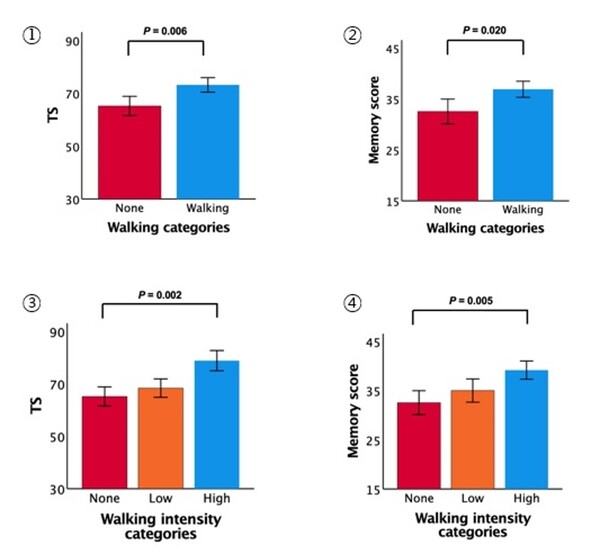
If people do walking exercises to the point of sweating and shortness of breath after middle age, they could slow or prevent Alzheimer's disease-related cognitive decline, a new study has found.
A group of researchers at Hallym University Dongtan Sacred Heart Hospital said Wednesday that they made the findings by examining the association between walking activity and cognitive function in older adults who participated in a cohort study.
Professors Kim Ji-wook, Choi Yeong-Min, and Seo Kuk-Hee of the Department of Psychiatry, Professor Kim Hyeon-su of the Department of Diagnostic Laboratory Medicine, and Professor Kim Jong-Wan of the Department of Surgery led the study.
Alzheimer's is one of the most common neurodegenerative diseases in older adults, making daily life difficult due to cognitive decline. However, there is no cure other than symptom-improving medications, making it important to prevent it through lifestyle changes.
The researchers divided the 188 participants in the cohort study aged 65-90 -- 107 with normal cognitive function and 81 with mild cognitive impairment -- into walking and non-walking groups to study the difference in cognitive function based on walking activity.
The minimum amount of walking activity was defined as 32 hours per year, 40 minutes per week, or two hours per week for four months of a season.
Participants were also categorized by duration and intensity of walking activity and starting age. For walking duration, they categorized more than six hours per week as “long” (50 participants) and less than six hours as “short” (75 participants). Those who did not meet the minimum walking duration were categorized as “non-walkers” (63 participants).
The walking intensity was categorized as "high intensity" (57 participants), "low intensity" (68 participants), or "non-walking" (63 participants) based on breathing, sweating, and ability to talk, using the Mayo Clinic's method of measuring exercise intensity. Based on starting age, they categorized them as the "beginning of middle age" (40-64 years old, 103 participants) and "beginning of old age" (65 or more, 22 participants).
They also assessed overall physical activity nutrition to control various influencing variables through dietary patterns, blood tests, and genetic testing for Alzheimer's disease.

The results showed that the walking group had higher AD-related cognitive function and better overall cognitive performance than the non-walking group.
The cognitive differences were significantly correlated with walking intensity and starting age. The high-intensity group had better cognitive function than non-walkers. Still, the low-intensity group was not significantly different, and those who started walking in middle age had better cognitive performance than those who started in older age.
However, the duration of walking activity had no significant effect on cognitive function when controlling for walking intensity.
"This study suggests that high-intensity walking exercise in midlife, which can cause sweating and shortness of breath, may protect people from AD-related cognitive decline," Professor Kim Ji-wook said. "The exact mechanism by which walking prevents AD-related cognitive decline is unclear. However, physical activity may modulate the amyloid beta that causes Alzheimer's disease and promotes neuroplasticity, preventing brain function decline."
The study was published in the August issue of Alzheimer's Research & Therapy, an international journal of Alzheimer's disease research and treatment.

